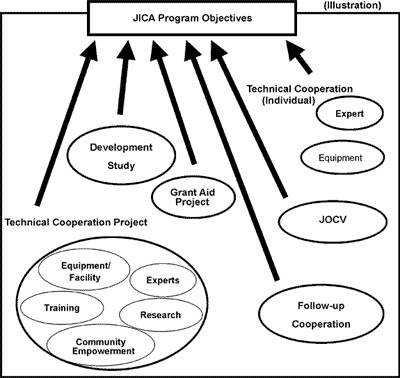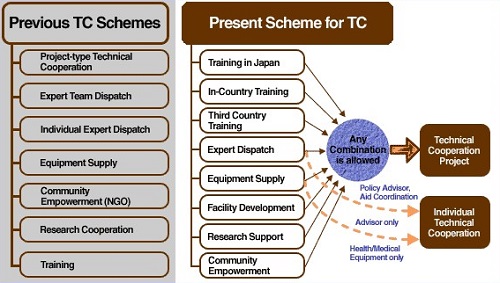JICA's New Approach to Technical Cooperation
Following the enactment of the Freedom and Information Act (a Japanese law enforcing public disclosure of government as well as administrative information) and the budget cut in FY 2002, the Japanese government through the JICA will implement a new form of Technical Cooperation.
Beginning Request Survey 2003, the Japanese government, through the JICA Philippine Office shall fully implement a new approach to technical cooperation. Schemes formerly known as Individual Expert Dispatch, Equipment Supply, Expert Team Dispatch, Research Cooperation, Counterpart, Individual / Country-focused / In-Country / Third Country Training and the Project-Type Technical Cooperation (PTTC) will be merged to form a single cooperation scheme which shall be known as a Technical Cooperation Project (TCP)
The implementation of the new form of technical cooperation aims to improve the quality and efficiency of technical cooperation. The following are the characteristics of a typical technical cooperation project: (i) designed to achieve certain objectives within a given budget over a specific project timeframe, (ii) inputs will be clearly defined and the outputs quantifiable; (iii) direct and foreseeable input-output relationship; and (iv) subject to an evaluation based on the project design matrix and or cost-benefit analysis.
Shift to "Program Approach"
JICA defines "JICA's Cooperation Program" as a group of related projects or services directed toward the attainment of specific (usually similar or related) objectives. In order for JICA to effectively and efficiently utilize its limited resources, it has focused the use of its resources to its priority issues / areas. JICA has likewise formulated a number of JICA cooperation programs under which various JICA schemes are effectively integrated.
Inasmuch as this "Program Approach" is being espoused to further strengthen JICA's cooperation programs, proponent agencies are therefore advised to consult JICA experts who are currently assigned in their agencies in the formulation of new project proposals. This is to ensure that the new project proposals are well coordinated with on-going JICA programs and projects.
The diagram below illustrates JICA's definition of Cooperation "Program" and "Project":
Program:A group of related projects or services directed toward the attainment of specific (usually similar or related) objectives.
Project:A planned undertaking designed to achieve certain specific objectives within a given budget and within a specified period of time.

Under the previous approach, Technical Cooperation (TC) was classified as either a PTTC, IEDP, ESP etc. Under the new approach, a TCP is defined as any or a combination of a number of components in order to attain certain objectives. This means that instead of combining schemes per se, a TCP would now be composed of any or a combination of the following components:

Possible Components of a Technical Cooperation
- 1 . Expert Dispatch - Based on the request of a Philippine government agency, JICA may dispatch either a Japanese or a third country expert to perform tasks related to his or her area of specialization and the actual requirements of the proponent agency. Third country experts refer to experts coming from another country besides Japan and the Philippines. Long-term experts are those assigned for a year or more while short-term experts have assignments, which are less than a year.
- 2 . Equipment Supply - The Japanese side may provide equipment to facilitate technology transfer within the scope of a project. However, the equipment supply component may only be availed of, if the request is in conjunction with other components e.g., equipment to support the work of JICA experts assigned in the Project.
- 3 . Training in Japan - Filipino counterparts of JICA Experts may be sent to Japan to receive training from the various JICA training centers located throughout Japan to facilitate better technology transfer.
- 4 . In-Country Training - In-country training denotes a method of training under which instruction is provided in their home countries to their fellow-countrymen by people who have themselves previously been trained through technical cooperation provided by Japan. This method makes possible the effective transfer of technology from Japan to the fringe areas of developing countries. And since local technicians are trained in their own languages, linguistic communication presents no problems and technology transfer can take place smoothly in line with local conditions.
- 5 . Third Country Training - Third Country Training conducted in the Philippines is geared primarily towards the officials and technical people of other countries. Similarly, Filipino trainees may also be trained in another country. By promoting technical cooperation in this way, participants can study in a climate and socio-economic environment similar to their own and are able to acquire appropriate technologies that are easy to apply to their own countries. JICA supports such third-country training by bearing the training costs involved as well as sending instructors from Japan.
- 6 . Facility Development - Under this component, recipient agencies may avail of assistance in the form of construction of facility. Said construction / improvement should support the technology transfer activities of a certain Technical Cooperation Project. The proponent may request a particular canvassed amount, however, in most cases, the Japanese side would approve requests, which are less than ¥20 million.
- 7 . Community Empowerment - This component is designed to facilitate the dissemination of technologies developed by a certain Project to the grass-root level. A proponent agency that wishes to disseminate a certain technology to the grass-root level may go into partnership with a non-governmental organization (NGO) to do the actual dissemination. The Japanese side will support the contractual arrangement between the proponent agency and the NGO. The amount which may be availed of is within the range of ¥5 -15 million.
- 8 . Research Support - This component is designed to support the research activities of Filipino researchers. Research topics should contribute to the social and economic development of the Philippines. The amount of support for a particular research activity is ¥5 million.
Individual Expert Dispatch
Individual experts are dispatched in response to requests from the government agencies. They are assigned to government-related organizations, where they provide policy advice to their counterpart personnel in their respective fields of expertise. They may also contribute in the project formulation for other types of cooperation programs.
There are two (2) categories of long-term experts, namely: 1) new, and, 2) successor or extension of the assignment of the existing expert. On the other hand, there are two (2) categories of short-term experts; namely: 1) general, and 2) seminar (duration of assignment is only one to two weeks).
Additional Information
The proponent agency is required to provide the following, but not limited to: (i) counterpart personnel to whom the expert will provide advice; (ii) office space for the expert; and, (iii) budget to cover for the cost of operating and maintaining the equipment which the expert may provide during the expert`s entire stay in the agency, the cost of participation of counterpart personnel in field visits. Please note that experts are dispatched to give policy advice to their counterparts, hence, they should not be requested to perform regular functions of the proponent/host agency.
List of Projects
(*TCP: Technical Cooperation Project)
Education
Health
- (TCP) The Project for Introducing Evidence-based Relapse Prevention Programs to Drug Dependence Treatment and Rehabilitation Centers in the Philippines (IntERlaPP)
- (TCP) Project for Cordillera-wide Strengthening of the Local Health System for Effective and Efficient Delivery of Maternal and Child Health Services
- (TCP) Project for Strengthening Maternal and Child Health Services in Eastern Visayas, Philippines (SMACHS-EV Project)
- (TCP) Maternal and Child Health Project




scroll